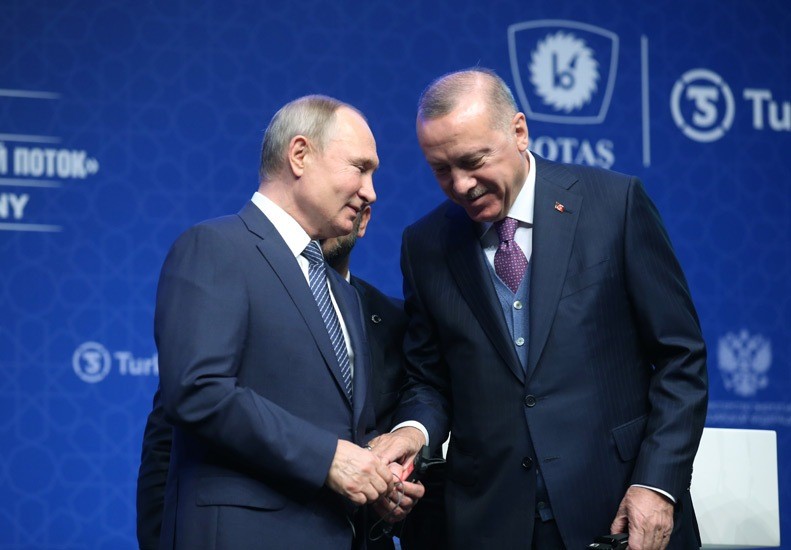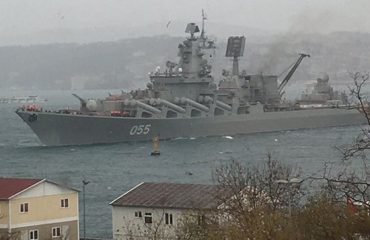
In a joint written statement on January 8, in Istanbul, Turkish President Tayyip Erdoğan and Russian President Vladimir Putin, as “mediators”, have called on fighting parties in Libya to cease fire as of 00.00 on January 12. The statement said that the “worsening” situation in the Libya civil war has been threatening “the security and stability of Libya’s wider neighborhood, the entire Mediterranean region, as well as the African continent, triggering irregular migration, further spread of weapons, terrorism and other criminal activities including illicit trafficking.” Turkish Foreign Minister Mevlüt Çavuşoğlu and Russian Foreign Minister Sergei Lavrov told the press that the ceasefire should be without any preconditions. Turkey and Russia also said that the initiative was in support of the Berlin Process for the future of Libya, which was initiated by German Chancellor Angela Merkel.
The parties made the ceasefire call in the wake of Erdoğan signing a security agreement with Libyan Prime Minister Fayez Al-Sarraj who has been under severe attacks by the rebel Khalifa Haftar forces, and also after the Turkish Parliament permitted the government to send Turkish troops to Libya in support of Sarraj. Even though Sarraj leads the UN-recognized government of Libya, Haftar has been supported by a number of countries including Egypt, the UAE and Saudi Arabia. Reports stating that about 1,400 members of the Russian private army, Wagner, were among the Haftar forces, had led to the belief that only Putin could stop him from taking the capital Tripoli, which could extend the civil war.
Will Haftar supporters accept this?
It is unlikely that Sarraj, who is under fire in his capital, which is under siege by Haftar, would reject the ceasefire. His and Erdoğan’s main worry was that Tripoli would fall before the Berlin Conference starts. Haftar’s decision will not be only his; it will be but his supporters’ decision, too. Seeing Sarraj as having links with the Muslim Brotherhood, the Abdel Fattah Al-Sisi rule, in Libya’s Eastern neighbor Egypt, has been the biggest supporter of Haftar, militarily as well. The UAE has deployed fighter jets to Egypt in support of Haftar, whom the International media has already started to label as “the second Sisi”.
Saudis were the main supporters of Sisi when he toppled the elected President of Egypt, Mohammad Morsi, in 2013. The ceasefire may mean a defeat for them. On the other hand, Russia is the permanent member of the UN Security Council with possible backing of China and neither the U.S., nor the UK, or France (despite its covert support to Haftar) would like to be accused of spoiling a ceasefire, as such a move could be labelled by Russia as sabotaging Germany’s Berlin Process. And particularly when the focus of the international relations is no longer on Libya but the U.S.-Iran crisis since the assassination of Qassem Soleimani, the Iranian special forces officer in Iraq.
Similarities with Syria ceasefire
Because Russia and Turkey declared themselves as mediators, it may be fair to assume that they are acknowledging the influence they have on the fighting factions of the divided country; Haftar and Sarraj.
This somehow resembles the ceasefire deal in Syria, where Turkey acknowledged its support to the forces against Syria’s UN-recognized President Bashar Al-Assad, excluding terrorist groups like ISIS and Al-Qaeda, which are recognized as such by the UN, and of course the PKK/PYD which Ankara considers as a threat to Turkey’s national security. Russia has been supportive of Assad from day one. Now, as we approach the Geneva conference and except for the situation regarding the northern town of Idlib near the Turkish border, the Syria situation has started to get under control. In Libya, a similar model is apparently under process, once again driven by Russia and Turkey.
And the bargain?
There is a crucial question here. Would a joint call for ceasefire be possible as Russia takes Turkey as its counterpart for the Libya ceasefire, if Turkey had not put its open support behind Sarraj and challenged the situation by declaring to send troops? If the ceasefire holds, that may freeze the debates about Turkey sending troops to Libya or Turkey-backed militias in Syria going to Libya to fight alongside Sarraj forces. The reported resignation of one of Erdoğan’s chief advisers, retired brigadier Adnan Tanrıverdi, who have been promoting openly to send mercenaries to Libya, right after the Putin-Erdoğan deal is a strong indication of that.
It is possible to assume that the telephone conversation between Russian Defense Minister Sergei Shoigu and Turkish intelligence (MİT) chief Hakan Fidan on January 6 has played a key role in agreeing on a joint ceasefire call, regarding the assessment of the actual situation in the Libya theatre, together with the efforts of both foreign ministers. That, in addition to Putin’s crucial last- minute visit to Assad on January 7, before arriving in Istanbul. No one will be surprised if a deal is reached between Turkey and Russia (and indirectly between Turkey and Syria) on Idlib, once the ceasefire deal holds in Libya.
If it’s a bargain, and if it will serve saving lives, it’s a good one.


